I bag big game on Twitter
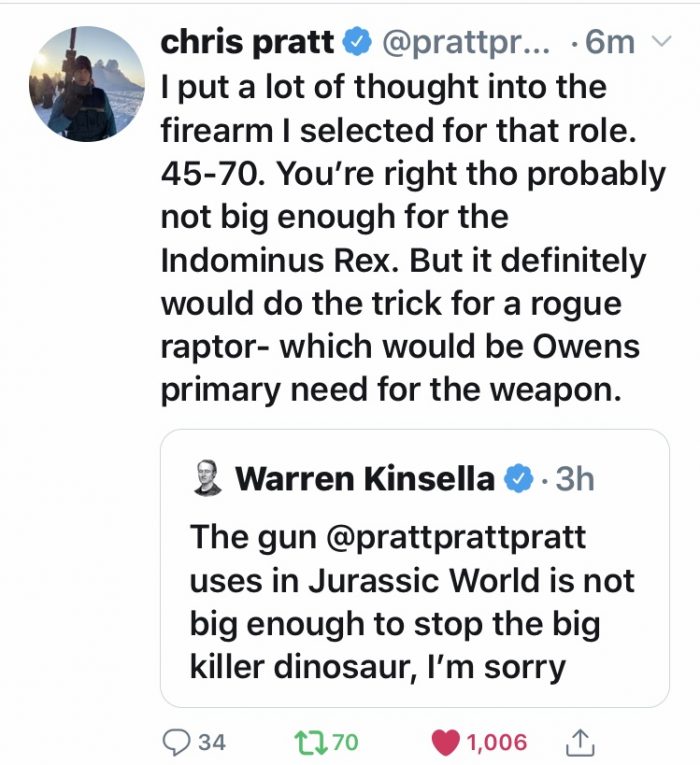

Heroes still walk among us.
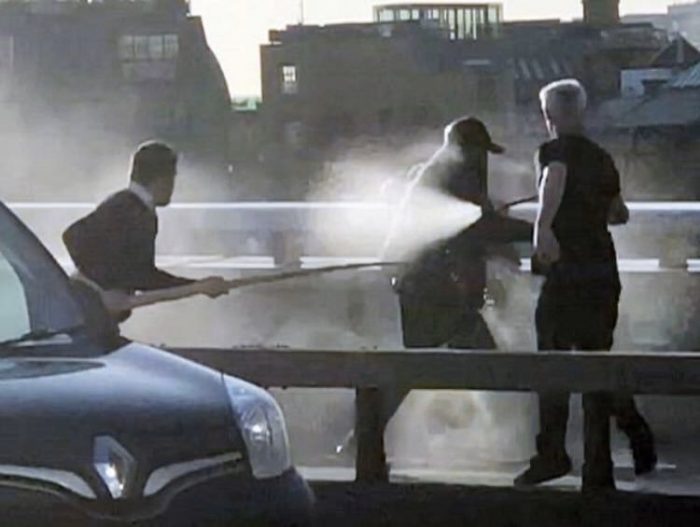
During the attempted coup against Mr. Chretien, these were my talking points. Mr. Scheer, you’re welcome.
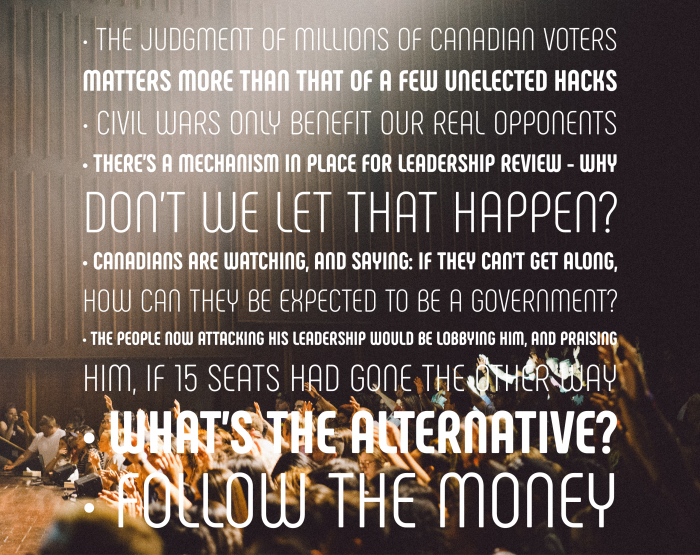
This afternoon at Daisy Group, right after this, one of my staff received a bomb threat.
We evacuated everyone at Daisy, and let our neighbours know, as well. We waited on the sidewalk on Bloor West. The police came and, as I was going through the building with them, looking for anything that shouldn’t be there, another one of my staff got called by the would-be bomber on his personal cell phone.
The police sergeant encouraged me to talk with this guy, while we taped it. On the recording, you’ll hear him claim to be a member of the neo-Nazi Soldiers of Odin – but he’s a liar. The SOO would never claim responsibility for a bomb threat, or make a threat to kill police when he knew they were listening in. And he didn’t even know the name of the founder of the SOO – and every member knows that.
As you can hear on the tape, however, he knew some details about us, and he sounds determined to cause damage. It was his demands that were most revealing – that I go on TV and admit that we were paid “foreign actors” (that typically means Jews) – to disrupt the People’s Party campaign.
CBC won’t cover this, of course, because they’re far more interested in depicting the racist PPC as victims, or writing about our personal lives to hurt us, after pretending to be sympathetic. But it’s obvious to us, at least, that a PPC supporter made the threats against us and the police.
And, as a result, this coward showed why – better than we ever could – Daisy Group was right to work to defeat the extremist People’s Party in the election. Which some people have told us we did.
If this guy’s voice sounds familiar to you – or the odd phrasings he uses (“kleptocracy,” “foreign actors,” “Nuremberg Laws,” etc.) – you can contact me via warren AT daisygroup DOT ca, and I will pass it along to the police officers who are handling this case. Thanks.
The recording is here:
How is that “exclusive.”
I mean, @kinsellawarren would yell that from rooftops or write songs to make it clear that’s what he thought. Confused why CBC would set him up as evil villain for saying what most of its staff said to each other in news meetings but wouldn’t report. pic.twitter.com/vJwmRNeEt8— Steven Ladurantaye (@ladurantaye) November 26, 2019
She’s a CBC reporter. She wrote to me in October, when I was feeling pretty down.
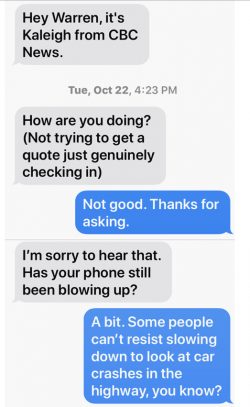
I saw it as a nice note. Human to human.
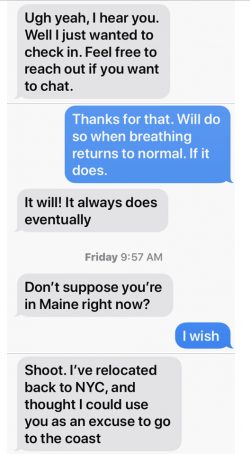
At this point, I think I’d be forgiven for thinking this exchange was wholly personal. Perhaps she had had experience with depression, too, perhaps she was simply being nice. But she sure wasn’t being a CBC reporter. I asked her about that.

She was living in New York. After that exchange, I thought nothing more of it.
Until I heard from former Daisy Group staff that she was calling them, that is. I was a bit stunned by that: had she actually been pretending to be nice to me, so I’d lower my guard? Wasn’t that unethical?
I told her I thought she had engaged in deception. I also said to her: “Anyone looking at [those messages] would feel as I do – that you were not being straight with me. At all.”
I felt she had breached CBC’s journalistic standards and practices. I felt she had breached their code of conduct. But I didn’t make a complaint.
Seeing now the story she has produced – in which she and Andrea Bellemare gratuitously, and without any relationship whatsoever to the story, mentioned that my marriage had broken up (winning her the tweeted support of CBC meat puppets Harry Forestell and Lucy van Oldenbarnev) – I wonder if I should have.
Kaleigh Rogers is an unethical reporter. Stay away from her (and the others).
I have been contacted by a CBC reporter who has told me that they have recordings secretly made at my firm in the Spring. The recordings are about anti-racism work we did. We’re really proud of that work.
Here’s a summary of what I said to this reporter.
We do not discuss client matters publicly. It is up to the client to make public the relationship.
But I can say we have proactively reached out to Elections Canada and disclosed everything we did up until June 29, 2019, when our work ended – as the law requires.
I have proudly been exposing and opposing racism for more than 30 years. Daisy Group has also exposed and opposed racists, anti-Semites, Holocaust deniers, Islamophobes and misogynists for many years. Many people and organizations seek us out to assist them in opposing hate.
I have proudly been exposing and opposing racism for more than 30 years. As a political assistant, in 1990, I documented known white supremacists joining Preston Manning’s Reform Party. In 1993, I documented Kim Campbell’s inadequate response to the presence of actual neo-Nazis in the Canadian Airborne Regiment. In 2000, as a political advisor, I documented the presence of known racists in Stockwell Day’s Canadian Alliance.
After lots of research, I concluded none of those leaders were in any way racist. However, their parties had a problem in those days, which was well-known.
But the extremism found in the People’s Party of Canada is far worse, and far more pervasive, than anything I experienced before.
We were, and are, very proud to shine a light on the many extremists found in the People’s Party of Canada.
Fascinating piece in the Times. Key reasons they messed up:
Excerpt:
By and large, nationwide surveys were relatively accurate in predicting the popular vote, which Hillary Clinton won by two percentage points. But in crucial parts of the country, especially in the Midwest, individual state polls persistently underestimated Mr. Trump’s support. And election forecasters used those polls in Electoral College projections that gave the impression Mrs. Clinton was a heavy favorite.
AAPOR’s analysis found several reasons the state polls missed the mark. Certain groups were underrepresented in poll after poll, particularly less educated white voters and those in counties that had voted decisively against President Barack Obama in 2012. Respondents’ unwillingness to speak honestly about their support for Mr. Trump may have also been a factor.
These and other issues could reappear in 2020, pollsters warn, if they’re not addressed directly.
To make sure their results reflect the true makeup of the population, pollsters typically “weight” their data, adding emphasis to certain respondents so that a group that was underrepresented in the random sample still has enough influence over the poll’s final result. Polls typically weight by age, race and other demographic categories.
But some state-level polls in 2016 did not weight by education levels, therefore giving short shrift to less educated voters, who tend to be harder to reach.
This often understated Mr. Trump’s support, since he was markedly more popular than past Republican nominees among less educated voters — and noticeably less popular among those with higher degrees, who research suggests are more likely to participate in polls.
The AAPOR analysts found that many polls in swing states would have achieved significantly different results had they been weighted for education. This, in turn, would have noticeably decreased Mrs. Clinton’s lead in much-watched polling averages and forecasts of these states.
